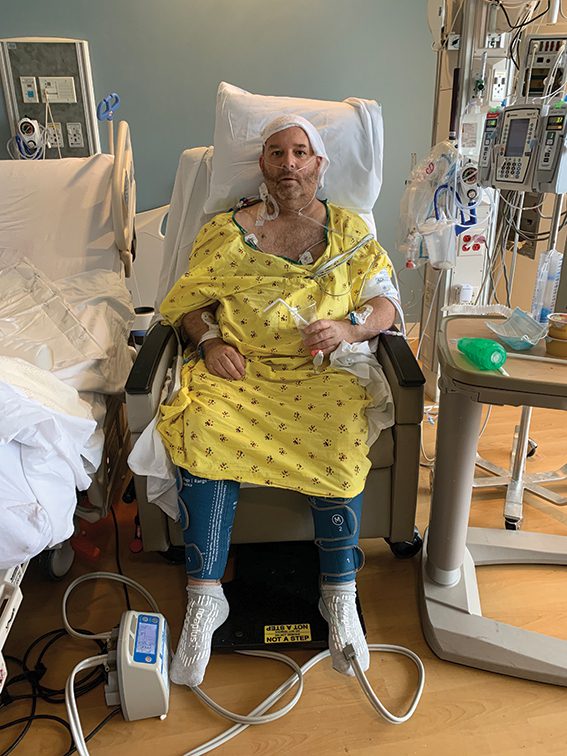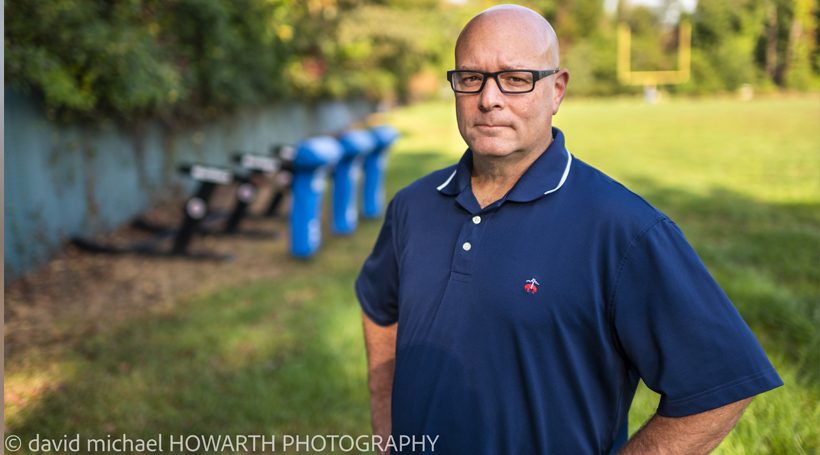Even after he was technically out of the woods – off the ventilator and out of the hospital – Brett Breslow was not ok.
In the earliest days of the pandemic, the 51-year-old Cherry Hill resident was intubated and put into a coma at Cooper University Hospital. His battle with Covid-19 raged for close to a month, but his recovery has taken much, much longer. Now, Breslow is grappling with the effects of “Long Covid” – persistent symptoms which stick with some survivors for weeks or months after the virus has subsided.
“It probably took me another 4 or 5 months of physical therapy just to get to the point where I was walking and using my arms and legs by myself without assistance,” Breslow says. It was a huge adjustment, “because I was used to being a very active person. I was in the gym 5 or 6 days a week. I was not able to exercise that way anymore. I’d lost probably 65 pounds while in the hospital, just from being sick and being on hospital food for 2 and a half months.”
When he did get home after a 6-week stint in a rehabilitation hospital, Breslow says he “immediately put a whole bunch of weight back on, probably more than I’d lost in the hospital, but I was immobile.” He couldn’t exercise because of his severely diminished lung capacity. “When you’ve had double pneumonia, acute respiratory distress, and you’ve been intubated for a month, your lungs need to recover,” he says. “I’d get winded just walking around the supermarket.”
There are a lot of unknowns around Long Covid. Doctors are still unclear who is most susceptible and how it should be treated. They also don’t have an official definition of the condition beyond “symptoms that continue for 12 weeks or more”. The World Health Organization, however, recognizes it as a legitimate diagnosis, and billions have been dedicated to Long Covid research.
One of the major Long Covid symptoms is lingering respiratory issues, says Judith Lightfoot, DO, chief of infectious disease and chair of internal medicine at Rowan University.
“We’re seeing lung and cardiac issues post-Covid. Shortness of breath is probably the biggest manifestation,” she says. “It’s mainly respiratory, like difficulty breathing. Some people are also having to go to rehab and physical therapy. They’re having trouble getting that rhythm back, being able to walk, get their weight back on and their strength back, do the things they used to do.”
When you’ve had your stamina and energy sapped by Long Covid, Lightfoot adds, it becomes “difficult to do normal things by yourself. The strength loss and weakness is enormous.”
And she would know. In March of 2020, Lightfoot was admitted to her own hospital with one of the region’s first serious cases of Covid. She was hospitalized for several days, but her recovery has taken much, much longer.
“I went from being physically active, taking spin classes, playing tennis, weight training…I lost so much weight, I looked like a shell of myself,” Lightfoot says. “Really, I wasn’t myself for a year. Before I got sick, I trained with a trainer for 90 minutes every Sunday morning. I could press 300 pounds with my legs. I couldn’t push 10 pounds when I got back to her in July. In terms of strength, it can take everything from you.”
Breslow’s battle with Covid-19 and his time on a ventilator resulted in kidney failure. A prednisone regimen helped him recover enough that he no longer needs dialysis, but “I have some permanent kidney damage,” he says. “That’s a physical ailment that’ll be with me forever.”
He also left the hospital with drop foot – a condition that makes it difficult to lift or flex the front part of the foot.

“It was from the way they positioned me in the hospital,” Breslow explains. “I was the first person they put in the prone position in the hospital. They knew from what was going on in Europe at the time that proning was good for the lungs, but they didn’t know what the side effects would be. If your arm falls asleep at night, you typically wake up and move. But I was on my right side for so long that when I woke up, my right arm and leg didn’t work at all. It turned out my tendons in my right leg were misaligned, and it really complicated things with walking.”
A specialist was able to help him regain an almost full range of movement, but the recovery, he says, still isn’t complete.
In the spring, Breslow hired a health coach, and he’s down 80 pounds. “I’m below my pre-hospital weight, but in a much healthier way,” he says. “I coach Cherry Hill youth football – a football program for kids at or below middle school age. Just getting out every night onto the field, being with the kids and being more active is great. At first, I was worried about a couple things: that I wouldn’t have the stamina to be on my feet for 2 hours or that on an uneven surface I’d fall over, but I worked through that. It’s exhausting, but being out there on the field is my exercise.”
Still, Breslow isn’t the man he was before Covid-19.
“I’m nowhere close, and it’s extremely frustrating. I’ve exercised and maintained fitness my entire life. I was a rescue swimmer in Desert Storm,” he says. “I considered myself a fairly healthy guy. At the age of 51, there are things I can’t do anymore that I used to jump right into.”
Breslow wants to bring as much attention as he can to Long Covid, so people know recovery from Covid isn’t always as simple as getting off the ventilator or out of the hospital.
“I don’t think people get it,” he says. “They see me and they say, ‘Oh, thank God you recovered.’ And I am thankful – there are 700,000 others who didn’t make it through and I’m thrilled to be here. But there is a loss that has happened for me that, well, it is depressing. I think there’s an emotional aspect to the recovery, knowing you can’t push yourself, wondering when or if you’ll be able to do those things again.”
Lightfoot has slowly recovered, too. She’s back to working out and playing a bit of tennis, though she can’t do either as long or as hard as she could pre-pandemic.
“I’ve had patients saying coming back from this is the hardest thing they’ve ever had to do,” she says. “This affects perfectly healthy people, and then the process of healing is slow. It’s not as quick as we want it to be. For some it’s mild, they recover, and they go on with their life. For others, it’s a long road.”
If nothing else, Breslow says he hopes people see his Long Covid struggle as a cautionary tale. There were no vaccines and little information available when he got sick, of course, but he doesn’t want anyone else to end up like him.
“I think first and foremost, the general population needs to understand that we should take every precaution we have,” he says. “I think Covid is a battle that we as a world are fighting right now, and everybody needs to do their part. Get vaccinated, if you can. Wear a mask. It’s not that complicated, and it’s really not that big of an inconvenience if you think about the alternative.”
He also wants people to understand, he adds, “that just because you see someone who has recovered and is walking around doesn’t mean they have their life fully back yet. Be kind to one another.”














